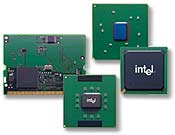NEW YORK (CNN/Money) -
Will wireless computing be the proverbial Next Big Thing? Intel must hope so -- it is betting about $300 million to promote it.
Unveiled Wednesday, Intel's wireless technology is dubbed Centrino. What's the big deal? It's the first time Intel (INTC: Research, Estimates) has developed a chip specifically for laptops that can connect to the Internet through so-called Wi-Fi (for wireless fidelity) networks.
With such networks, there is no cable or phone line needed, provided there's either a local network set up in a home or office or a "hot spot," any public area, such as a restaurant, hotel or airport, that enables access to wireless networks run by companies such as T-Mobile and AT&T Wireless. According to Intel, there will be 10,000 such locations worldwide by the end of the year.
| More about Intel
|

|
|
|
|
Several major PC manufacturers, including Dell, IBM, Sony and Toshiba, also unveiled laptops Wednesday that include Centrino technology, which in addition to a new Pentium M processor also features a wireless chipset and a card that ultimately connects users to the wireless networks.
The chips will be lighter and consume less power than previous chips, which will make the laptops themselves thinner and more convenient to lug around and surf the Web anywhere there is a hotspot. In addition, they will run for longer periods of time before needing to be recharged. Intel has established partnerships with McDonald's and Borders to have hotspots in some of their locations.
Cool, but not the answer to tech's problems
Sounds pretty cool, huh? And the hope among industry followers is that wireless will be just the thing to finally spur greater corporate information technology (IT) spending. Leslie Fiering, an analyst with tech research firm Gartner said that despite the big ad blitz, Intel's main goal is to get businesses to buy lots of laptops.
 |
|
| You can surf the Web at McDonald's on a laptop that features Intel's new Centrino technology |
"This is designed to promote faster adoption of Wi-Fi and with that promote notebook sales by corporations," Fiering said.
However, huge demand won't develop overnight. "A lot of companies are not prepared to support wireless infrastructure," said Matt Sargent, an analyst with tech research firm ARS. "There are still concerns about security." Sargent predicts that most companies still are at least six months away from major laptop upgrades.
And Fiering concedes that wireless laptops will have the most appeal to smaller businesses at first, not the large corporate accounts craved by the likes of Dell, IBM and Hewlett-Packard.
Consumers might be more willing to adopt this type of technology...hence, the partnerships with Borders and McDonald's and the huge marketing blitz. But the prices for Centrino laptops range from $1,399 to $2,399, which Sargent thinks will be a tough sell in this economy.
This isn't new either
Plus, it's not as if Intel is inventing the concept of wireless networks. Intel's presence may help legitimize wireless computing but consumers and corporations have had other options for a while now.
 |
|
| Intel outside: A look at the new Centrino wireless chipset |
The major PC manufacturers already sell laptops featuring wireless chips from privately held Atheros Communications, Broadcom (BRCM: Research, Estimates) and Intersil (ISIL: Research, Estimates). "Intel is somewhat late to the game," said Sarah Kim, an analyst with tech research firm Yankee Group.
In addition, Intel arch rival Advanced Micro Devices (AMD: Research, Estimates) also introduced a mobile chip Wednesday, the Athlon XP-M. Fujitsu and Sharp are using this chip in its latest line of notebooks.

|

